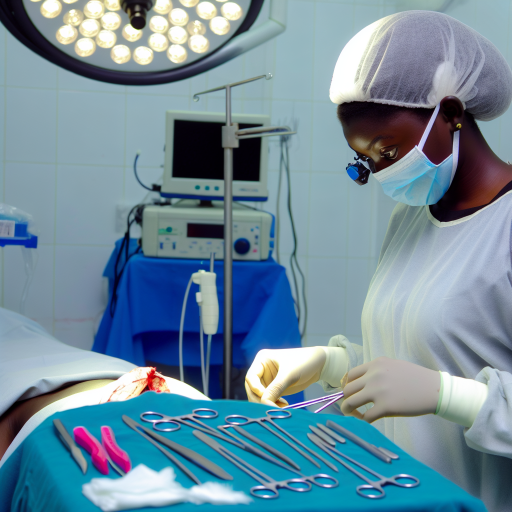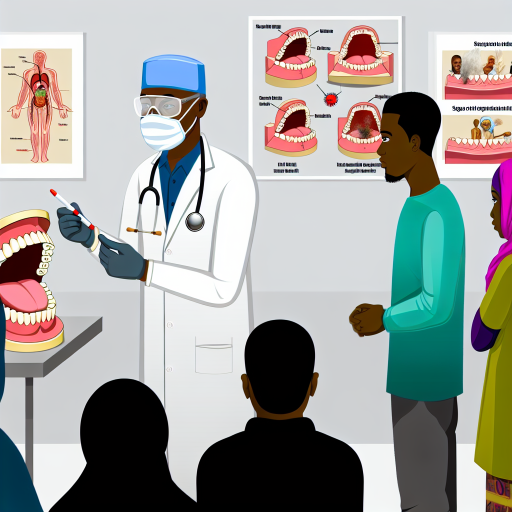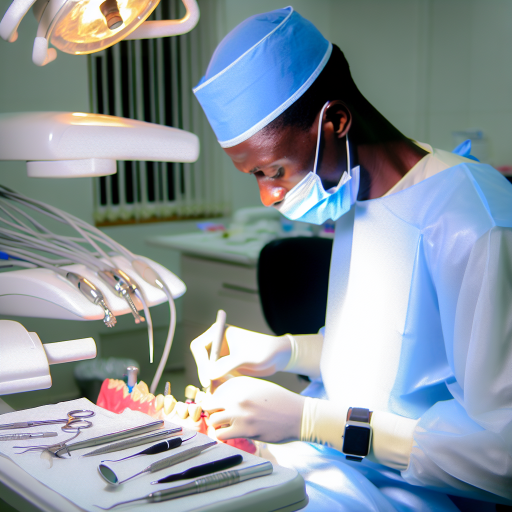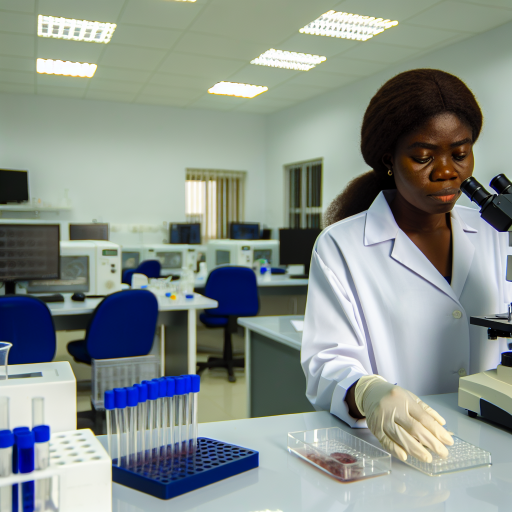Introduction:
Medical microbiology in Nigeria plays a crucial role in disease diagnosis and management.
The field is essential for understanding the causes of infections and outbreaks.
Innovations in Nigerian medical microbiology have revolutionized the way diseases are diagnosed and treated.
Brief Overview of Medical Microbiology in Nigeria:
Medical microbiology focuses on the identification of microorganisms that cause infections in humans.
In Nigeria, medical microbiologists work tirelessly to isolate and identify pathogens responsible for various diseases.
This information is crucial for the effective treatment and control of infectious diseases in the country.
Importance of Innovations in the Field:
Innovations in Nigerian medical microbiology have led to faster and more accurate diagnosis of infections.
Advanced technologies have enabled medical professionals to identify pathogens with precision.
This has significantly improved patient outcomes and reduced the spread of infectious diseases.
Thesis Statement on the Significance of Advancements in Nigerian Medical Microbiology:
The advancements in Nigerian medical microbiology have contributed to better healthcare outcomes for patients.
These innovations have enhanced disease management strategies and promoted public health.
As technology continues to evolve, the field of medical microbiology in Nigeria will continue to benefit from new discoveries.
Historical perspective:
Medical microbiology in Nigeria has a rich history dating back to colonial times.
In the early 20th century, Nigeria saw the establishment of laboratories focused on studying infectious diseases.
Key milestones include the discovery of the first cases of yellow fever in Nigeria in the 1940s.
Breakthroughs in the 1960s led to the development of vaccines for diseases like polio and measles.
Past innovations, such as the introduction of modern laboratory techniques, laid the foundation for future advancements.
Current landscape:
Today, Nigerian medical microbiology is a robust field with significant contributions to global health.
The country boasts world-class research institutions and laboratories focused on infectious diseases.
Collaboration with international organizations has helped Nigeria tackle diseases like HIV/AIDS and malaria.
Technological advancements have enabled faster and more accurate diagnosis of infectious diseases.
Ongoing research is focused on developing new vaccines and treatments for emerging pathogens.
Future directions:
Nigeria is poised to continue its trajectory as a leader in medical microbiology innovation.
Investment in research infrastructure and training programs will drive further advancements in the field.
Partnerships with global health organizations will enhance Nigeria’s capabilities in disease surveillance and response.
Embracing genomics and personalized medicine will shape the future of medical microbiology in Nigeria.
With a strong foundation and a commitment to excellence, the future of medical microbiology in Nigeria looks promising.
Current challenges in Nigerian medical microbiology:
- Identifying major challenges faced by practitioners and researchers in the field.
- Discussing the impact of these challenges on public health and healthcare delivery.
- Emphasizing the need for innovative solutions to address these issues.
Identification of major challenges:
One of the major challenges faced by practitioners and researchers in Nigerian medical microbiology is the lack of adequate funding for research initiatives.
This hinders the development of new treatments and diagnostic tools for various infectious diseases.
Another challenge is the limited access to state-of-the-art technology and equipment in many healthcare facilities in Nigeria.
This impedes the efficiency and accuracy of microbiological testing and analysis, leading to delays in treatment and misdiagnoses.
Additionally, there is a shortage of skilled personnel in the field of medical microbiology.
Many practitioners and researchers lack the necessary training and expertise to effectively address the complex issues surrounding infectious diseases.
Impact of these challenges on public health and healthcare delivery:
The aforementioned challenges have a significant impact on public health in Nigeria.
They contribute to the high prevalence of infectious diseases and the spread of antibiotic-resistant pathogens.
Due to the lack of funding and access to advanced technology, healthcare facilities struggle to provide timely and accurate diagnoses.
This results in delays in treatment initiation and the potential for disease progression among patients.
Furthermore, the shortage of skilled personnel in medical microbiology leads to gaps in knowledge and expertise.
This affects the overall quality of healthcare delivery and increases the risk of healthcare-associated infections.
Innovative solutions for better healthcare:
Given the challenges faced by practitioners and researchers in Nigerian medical microbiology, there is an urgent need for innovative solutions to address these issues.
Transform Your Career with Expert Guidance
Get personalized mentorship consulting that’s tailored to your unique path. Our expert advice is actionable and exclusive.
Get StartedOne potential solution is increased investment in research and development efforts.
This will support the creation of new diagnostic tools, treatments, and preventive measures for infectious diseases prevalent in Nigeria.
Another solution involves improving access to training and education programs in medical microbiology.
This will enhance the skills and knowledge of healthcare professionals and researchers in the field.
Collaboration with international partners and organizations can also help bridge the technology gap.
Additionally, it will provide access to advanced microbiological testing methods and equipment for healthcare facilities in Nigeria.
Addressing the current challenges in Nigerian medical microbiology requires a multi-faceted approach.
The approaches need to involve financial support, technological advancements, and capacity-building initiatives.
By implementing innovative solutions, practitioners and researchers can improve public health outcomes.
This enhancement will also elevate healthcare delivery in Nigeria.
You Might Also Like: Developing Soft Skills for Nigerian Medical Practitioners
Emerging technologies and techniques:
Medical microbiology in Nigeria has seen significant advancements in recent years.
Thanks to the adoption of new technologies and techniques.
These innovations have the potential to revolutionize the field.
They impact diagnosis, treatment, and research in profound ways.
Next-generation sequencing (NGS):
NGS has emerged as a powerful tool in medical microbiology.
This technology allows for the rapid and accurate sequencing of microbial genomes.
In Nigeria, NGS has been used to characterize microbial pathogens.
It tracks the spread of infectious diseases and studies antimicrobial resistance patterns.
This technology has greatly enhanced our understanding of microbial diversity and evolution.
It enables more targeted and effective treatment strategies.
Matrix-assisted laser desorption/ionization time-of-flight mass spectrometry (MALDI-TOF MS):
MALDI-TOF MS is another cutting-edge technology adopted in Nigerian medical microbiology laboratories.
This technique allows for the rapid and accurate identification of microbial species.
It is based on their protein profiles.
By quickly identifying pathogens, clinicians can prescribe appropriate antimicrobial therapies.
This leads to better patient outcomes and reduced healthcare costs.
Polymerase chain reaction (PCR) techniques:
PCR techniques have played a crucial role in the diagnosis of infectious diseases in Nigeria.
Real-time PCR, multiplex PCR, and other PCR-based assays have enabled rapid detection of pathogens.
These techniques aid in the early diagnosis and treatment of infections.
They improve patient care and contribute to the surveillance and control of infectious diseases.
Metagenomics:
Metagenomic studies have become increasingly popular in Nigerian medical microbiology research.
By analyzing genetic material present in clinical samples, metagenomics provides insights into microbial communities.
This information is valuable for understanding disease mechanisms and identifying new pathogens.
It can also help in predicting treatment outcomes.
Advanced imaging techniques:
Advanced imaging techniques, such as transmission electron microscopy (TEM) and atomic force microscopy (AFM), have been used in Nigerian medical microbiology.
They visualize microbes at high resolution.
These imaging modalities allow for the detailed study of pathogen morphology, structure, and behavior.
This aids in developing novel therapeutic approaches and vaccines.
The adoption of emerging technologies and techniques in Nigerian medical microbiology has opened up new opportunities for improving healthcare delivery.
It enhances research capabilities and combats infectious diseases.
As these innovations continue to evolve, the future looks promising for medical microbiology in Nigeria.
Discover More: Radiography Program Accreditation in Nigeria
Collaborations and partnerships:
- Explore collaborations between Nigerian institutions and international organizations
- Discuss the benefits of these partnerships in driving innovation in medical microbiology
- Highlight successful case studies and their contributions to the field
Benefits of Collaborations in Medical Microbiology:
Collaborations between Nigerian institutions and international organizations bring together diverse expertise and resources.
This creates a synergy that accelerates research and development in the field of medical microbiology.
By pooling their strengths, both parties can tackle complex challenges more effectively and efficiently.
Moreover, partnerships allow for the sharing of knowledge, technology, and best practices.
This exchange of ideas fosters innovation and facilitates the translation of research findings into practical solutions.
Collaborations also provide opportunities for capacity building, enabling local scientists to gain new skills and experience.
Successful case studies serve as examples of how collaborations can lead to significant advancements in medical microbiology.
For instance, a partnership between a Nigerian research institute and a global pharmaceutical company resulted in the development of a new diagnostic tool for infectious diseases.
This breakthrough has enhanced the detection and treatment of various pathogens, improving patient outcomes.
Another successful collaboration involved a joint effort between Nigerian and international universities to study antimicrobial resistance in the country.
By combining their expertise, the researchers were able to identify novel mechanisms of resistance and develop strategies to combat the growing threat of drug-resistant infections.
These findings have informed policy decisions and influenced clinical practices in Nigeria and beyond.
Collaborations and partnerships play a crucial role in driving innovation in medical microbiology.
By fostering teamwork, knowledge sharing, and resource mobilization, these initiatives contribute to the advancement of research and the development of new technologies.
As Nigeria continues to make strides in this field, collaboration with international partners will be essential for achieving sustainable progress and improving public health outcomes.
Uncover the Details: Government Programs for Child Dental Health

Role of government and funding:
Government plays a crucial role in supporting research and development in medical microbiology.
It provides the necessary infrastructure, resources, and policies to facilitate innovation in the field.
- Government funding
- Funding opportunities
- Impact of government policies
The government allocates funds to research institutions and scientists to conduct studies and experiments.
This financial support enables researchers to explore new ideas and technologies in medical microbiology.
There are various funding opportunities available for researchers and institutions in Nigeria.
These include grants from government agencies, foundations, and international organizations.
Government policies have a significant impact on innovation in medical microbiology.
Regulations and guidelines set by the government shape the direction of research and development in the field.
Overall, the government plays a vital role in fostering innovation in Nigerian medical microbiology through funding, support, and policy development.
See Related Content: Salary Expectations for Anatomical Pathologists in Nigeria
Ethical considerations:
– Addressing ethical issues related to innovations in medical microbiology is crucial for maintaining integrity in research.
– Responsible research practices ensure that patient safety is prioritized throughout the development and implementation of new technologies.
– Ethical considerations play a significant role in influencing the adoption of new technologies in medical microbiology.
Importance of ethical considerations:
- Protecting patient rights: Ethical guidelines help in safeguarding the rights and dignity of research participants.
- Maintaining integrity: Adhering to ethical standards fosters trust in the scientific community and ensures the reliability of research outcomes.
- Promoting transparency: Ethical considerations encourage transparency in research practices, allowing for reproducibility and accountability.
Responsible research practices:
- Informed consent: Obtaining informed consent from study participants is essential to ensure that they understand the risks and benefits of participating in research.
- Confidentiality: Protecting the confidentiality of patient information is crucial for maintaining privacy and trust in research settings.
- Conflict of interest disclosure: Researchers must disclose any conflicts of interest that may influence the outcomes of their studies to maintain integrity.
Impact on patient safety:
- Minimizing risks: Ethical considerations help in identifying and mitigating potential risks to patient safety during the development of new technologies.
- Ensuring quality care: By integrating ethical principles into research practices, healthcare providers can deliver high-quality and safe patient care.
- Upholding professional standards: Ethical considerations guide healthcare professionals in making decisions that prioritize patient safety and well-being.
Influence on technology adoption:
- Regulatory compliance: Ethical considerations influence the regulatory approval process for new technologies, impacting their adoption in clinical settings.
- Public trust: Ethical research practices build public trust in new technologies, facilitating their acceptance and adoption in healthcare settings.
- Legal implications: Failure to address ethical considerations can lead to legal and reputational consequences, affecting the adoption of innovative technologies.
Ethical considerations are essential in shaping the development, implementation, and adoption of innovations in Nigerian medical microbiology.
By prioritizing patient safety and responsible research practices, healthcare professionals can ensure the ethical advancement of medical microbiology for the benefit of society.
Advancements in Medical Microbiology in Nigeria
The innovations in Nigerian medical microbiology have significantly improved healthcare in the country.
From the development of rapid diagnostic tests to the use of genomic sequencing for disease surveillance, these advancements have revolutionized the field.
It is crucial to highlight the importance of continued research and development in medical microbiology to address emerging infectious diseases.
Stakeholders must support and invest in these advancements for the benefit of public health.
A collaborative approach is essential. By committing resources to research, Nigeria can strengthen its healthcare system.
Moreover, investment will better prepare Nigeria to respond to future health challenges.
The future of medical microbiology in Nigeria relies on the commitment of all stakeholders to prioritize innovation and research in the field.
Together, we can drive advancements in medical microbiology that will have a lasting impact on healthcare delivery and public health outcomes in Nigeria.
Additional Resources
Implementing health worker training on sepsis in South Eastern …




